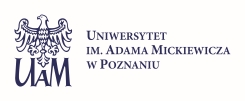Conference Info
The Committee of Linguistics of Polish Academy of Sciences with cooperation with the Faculty of Languages, Nicolaus Copernicus University, Poland, and the Faculty of Polish and Classical Philology, Adam Mickiewicz University in Poznań, Poland, will host a two-day workshop on diachronic Slavonic syntax, with special reference to the functional organisation of utterance as the minimal communicative unit in diachronic and comparative perspective in Slavic languages. The workshop is part of the workshop series Diachronic Slavonic Syntax (DSSL).
The workshop is dedicated to the study of the causes and mechanisms of syntactic change in Slavonic languages, with a special focus on the shifts in such areas of utterances as:
- the functional perspective of the sentence expressed in terms of focus, theme, rheme, transition etc.,
- syntactic markers of modality understood as a category covering indications either of a kind of speech act or of the degree of certainty with which something is said (cf. Matthews 2007: 247),
- all extra-grammatical means of organizing an utterance (cf. Daneš 1964: 228),
- variations of the linear order of the sentence as the means of coding or constructing the meaning,
- extra-sentence comments, including conjunctions, connectives, discourse particles
- suprasegmental coding of the meaning
- etc.
Functional approaches to linguistic research, in particular in the field of syntax, are usually applied and tested to the contemporary linguistic phenomena. We propose to reflect on the functional aspects of Slavic syntax both in diachronic and comparative perspectives, taking into account reference to the influences of Greek and Latin. The aim is to promote recent developments in the field, be it empirical, theoretical or methodological, as well as the confrontation between contemporary theoretical approaches and the analysis of old Slavic texts.
The conference will feature keynote speeches by Svetlana M. Tolstaya (Russian Academy of Sciences) and Björn Wiemer (Johannes Gutenberg University Mainz).
The conference is generously supported by Polish Academy of Sciences, Institute of Polish Language Nicolaus Copernicus University, and Faculty of Polish and Classical Philology, Adam Mickiewicz University in Poznań
 |
 |
 |
Organizers: Agnieszka Słoboda, Piotr Sobotka


